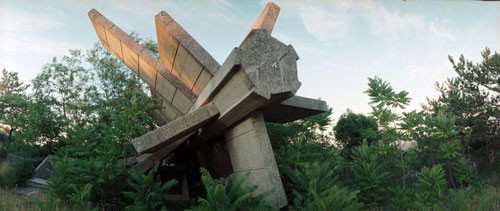Spaceship Yugoslavia - The Suspension of Time
24 Sep - 30 Oct 2011
SPACESHIP YUGOSLAVIA - THE SUSPENSION OF TIME
24 September – 30 October 2011
Spaceship Yugoslavia–The Suspension of Time seeks to investigate the treatment of (post-) yugoslav history from a contemporary perspective. The exhibition presents artistic projects as well as theoretical positions that highlight political and socio-economic aspects of the post-Yugoslav reality. It aims to strengthen and establish critical viewpoints on the various politics of the former Yugoslav nationstates in the so-called transition to capitalism.
Adela Jušić / Lana Čmajčanin, Alban Muja, Bojan Fajfrić, Damir Radović, Igor Grubić, Hristina Ivanoska, Klopka za pionira, Marko Krojač (Marc Schneider), Marijan Crtalić, Marcel Mališ, Monument Group, Nina Höchtl, Peter Mlakar / Laibach, Phil Collins, Sebastjan Leban / Staš Kleindienst, Vahida Ramujkić, Vesna Pavlović
Since the transformation of the European socialist state systems after 1989, the political positions of the postcommunist era have negated almost every facet of the previous system as part of a totalitarian entity in an effort to legitimize their own claims for freedom regarding ethnic identity and/or private ownership.
By challenging such tendencies, the exhibition seeks to address the topic of a Socialist reality - often dismissed as “historical” - which allows the possibility of re-thinking and re-naming such reality as an alternative construction. “Evacuated” from the sphere of the private-personal, the topic will be analysed within the context of concrete political developments such as the recent or future integration of the ex-Yugoslav states into the European Union. Beyond romanticizing retrospect or established (art-)historical positions of dissidence, the NGBK exhibition presents works predominantly by younger artists. The show aims to serve as a platform for self-initiated education and as a framework for reflection, within which a range of critical perspectives on the past and the present can become manifest.
Spaceship Yugoslavia poses the question: in what way can this past be thought of and reflected on today, a past which for a younger generation is accessible only through the filter of an ideologically led public denial? To what extent could a recognition of this past possibly contribute to the conception of future realities without being caught up in nostalgia or revisionism? This question concerns more than the analysis of “historical reality” presented in former Yugoslavia today; it is also the Berlin context which lends itself to a renewed investigation into the narratives of the prevailing German unification discourse.
Spaceship Yugoslavia–The Suspension of Time invites visitors to query normative narrations and to counter them by means of meticulous research and aesthetic examination.
24 September – 30 October 2011
Spaceship Yugoslavia–The Suspension of Time seeks to investigate the treatment of (post-) yugoslav history from a contemporary perspective. The exhibition presents artistic projects as well as theoretical positions that highlight political and socio-economic aspects of the post-Yugoslav reality. It aims to strengthen and establish critical viewpoints on the various politics of the former Yugoslav nationstates in the so-called transition to capitalism.
Adela Jušić / Lana Čmajčanin, Alban Muja, Bojan Fajfrić, Damir Radović, Igor Grubić, Hristina Ivanoska, Klopka za pionira, Marko Krojač (Marc Schneider), Marijan Crtalić, Marcel Mališ, Monument Group, Nina Höchtl, Peter Mlakar / Laibach, Phil Collins, Sebastjan Leban / Staš Kleindienst, Vahida Ramujkić, Vesna Pavlović
Since the transformation of the European socialist state systems after 1989, the political positions of the postcommunist era have negated almost every facet of the previous system as part of a totalitarian entity in an effort to legitimize their own claims for freedom regarding ethnic identity and/or private ownership.
By challenging such tendencies, the exhibition seeks to address the topic of a Socialist reality - often dismissed as “historical” - which allows the possibility of re-thinking and re-naming such reality as an alternative construction. “Evacuated” from the sphere of the private-personal, the topic will be analysed within the context of concrete political developments such as the recent or future integration of the ex-Yugoslav states into the European Union. Beyond romanticizing retrospect or established (art-)historical positions of dissidence, the NGBK exhibition presents works predominantly by younger artists. The show aims to serve as a platform for self-initiated education and as a framework for reflection, within which a range of critical perspectives on the past and the present can become manifest.
Spaceship Yugoslavia poses the question: in what way can this past be thought of and reflected on today, a past which for a younger generation is accessible only through the filter of an ideologically led public denial? To what extent could a recognition of this past possibly contribute to the conception of future realities without being caught up in nostalgia or revisionism? This question concerns more than the analysis of “historical reality” presented in former Yugoslavia today; it is also the Berlin context which lends itself to a renewed investigation into the narratives of the prevailing German unification discourse.
Spaceship Yugoslavia–The Suspension of Time invites visitors to query normative narrations and to counter them by means of meticulous research and aesthetic examination.

